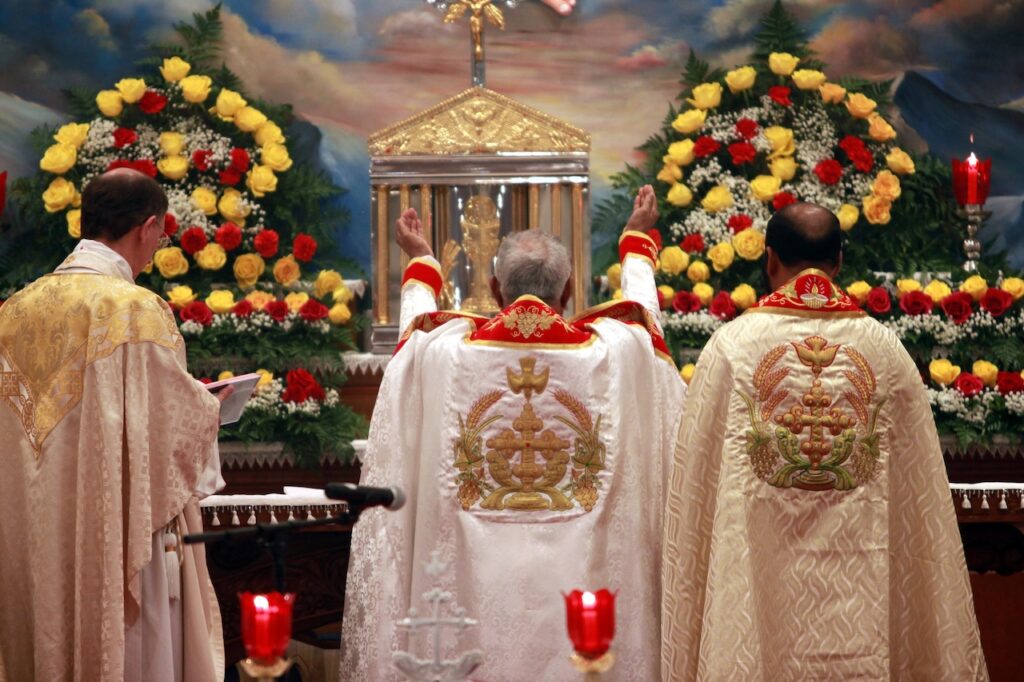THIRUVANANTHAPURAM, India (OSV News) — The crisis-ridden Syro-Malabar Catholic Church in India has set a deadline to solve its decades-old liturgy dispute.
The Church based in southern Kerala state has asked all defiant priests in the Ernakulam-Angamaly Archdiocese to follow the synod-approved (or “uniform”) Mass, in which the celebrant faces the altar during the Eucharist, on or before July 4 or face expulsion.
The Church’s head, Major Archbishop Raphael Thattil, and Bishop Bosco Puthur, the archdiocese’s apostolic administrator, set the deadline in a joint pastoral letter issued June 9.
The Church leaders also asked that the circular be read in all parishes June 16. Except for the archdiocese, which also is the seat of power of the Syro-Malabar Church, all 34 dioceses of the Catholic Church in India and abroad have implemented the synod-approved Mass.
Syro-Malabar Catholics in India, especially in the Church’s primary Archdiocese of Ernakulam-Angamaly, have been embroiled in a controversy for more than two decades over the celebration of the Eucharistic liturgy, which they call the Holy Qurbana.
After years of debate about tradition, Latinization and modernization, in 1999 the synod of bishops of the Syro-Malabar Church issued uniform rubrics for the celebration to end a situation in which some priests faced the altar during the entire liturgy, while others faced the congregation throughout the liturgy. The bishops’ decision was to have the priest face the altar during the Eucharistic prayer but face the congregation during the Liturgy of the Word and again after Communion.
Priests in most Syro-Malabar dioceses complied, but dispensations were issued for the Archdiocese of Ernakulam-Angamaly and a few other territories, allowing priests to continue celebrating the whole liturgy facing the people. The bishops decided to end the dispensations in November 2021 but a group of priests, religious and laity in the archdiocese, claiming to have the support of the majority of the faithful, still celebrates the entire liturgy with the priest facing the congregation as had been the practice since 1970.
Most priests and laity in the archdiocese, home to some 10% of the 5 million Syro-Malabar Catholics, wanted the celebrants to face the people throughout the Mass.
The June 9 circular asked the archdiocese’s seminarians and deacons to sign a document saying they would celebrate the synod-approved Mass, failing which they would not be ordained.
It told Catholics that participating in a Mass in the Church other than the synod-approved one after July 3 would be invalid, and such Masses would not satisfy the Sunday obligation. The circular also said priests without the bishop’s mandate would not be allowed to administer parishes or Church-run institutions.
However, leaders spearheading the struggle say they will not accept the synod-approved Mass.
“Let me make it very clear we are not going to accept the synod-approved Mass,” said Riju Kanjookaran, the spokesperson of the Archdiocesan Movement for Transparency, a group representing priests, religious and laity that spearheads the protest.
“This is an arbitrary decision taken without consulting our priests and lay leaders, and nobody is bound to comply with it,” he told UCA News June 10.
Kanjookaran questioned the validity of the pastoral letter when an extraordinary synod has been convened for June 14 to discuss the liturgy dispute.
“It clearly shows that the synod does not want to listen to either priests or the laity. They instead want to have their way,” he added.
All the parishes have passed resolutions supporting the 1970 Mass and handed them over to the synod and the Vatican. The archdiocese has close to 470 priests, and 450 priests stand for the traditional Mass, he said.
In May, Pope Francis said the divisions within the Syro-Malabar Catholic Church in India are the work of the devil, who has convinced some people, including priests, that their way is the only way to celebrate the Eucharist.
“This is where the devil — the devil exists — the divider, creeps in thwarting the most heartfelt desire the Lord expressed before he sacrificed himself that we, his disciples, would be one, without divisions, without breaking communion,” the pope said May 13 in an audience with Archbishop Thattil, and pilgrims from the Eastern Catholic Church.

